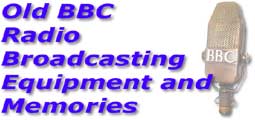The Notice Board for
ex-BBC staff puts former colleagues in touch with each other and gives
them a place to exchange thoughts and memories.
The Institute of Professional
Sound is a forum for all audio professionals, and is committed to providing
training for its members in all aspects of audio operations.
The
London Twin-Wave Broadcasting Station at Brookmans Park is described
in a site based on a 1930 souvenir booklet published by the BBC.
BBCeng.info is
a site of recollections of BBC engineering from 1922 to 1997. Among other
treats are downloadable PDFs of copies of Eng Inf, the quarterly newsletter
for BBC engineering staff.
Ray White's site traces
the engineering history of the Radiophonic Workshop at Maida Vale
from its beginnings in the 1950s until its demise in the mid-90s.
The Stars
of Wireless site, created by Roger Wilmut, features a number of recordings
of radio performers from the 1920s and 30s. The site includes a selection
of early broadcasting photographs including some of Savoy Hill. There are
also adverts from the 20s and 30s as they appeared in the BBC Year Books.
Another
section called "Fragments of an informal History of Broadcasting"
includes a good overview of the development of audio recording in BBC Radio
from the Blattnerphone to digits.
Roger
has also posted some of his own photos, mostly of Bush House, here.
One of the best sites dealing with the BBC's past was Arthur Dungate's Direct Television from Alexandra Palace. The site has been absent for some time but many thanks to Chris Booth who has restored it with Arthur's help. Well worth a visit.
The Alexandra Palace Television Society's aim is to preserve the oral and written history of the pioneers who inaugurated the world's first, regular, public high-definition television service from Alexandra Palace, North London, in 1936.
Alexandra Palace also features in the memories of Bob Taylor. He worked there from 1963 until News moved to Television Centre in 1969 and describes working practices in both places.
The Tech Ops Nostalgia Site features pictures and stories from 40 years of cameras, sound and lighting at BBC Television.
Another television site presents a record of BBC VT. Started to mark the 40th anniversary of videotape in the BBC in 1998 the site has many photographs from the age of sticky tape to that of digits. Martin Kempton's "Incomplete history of London's television studios" features lots of information, photos and drawings of...well, guess!
Brian Summers is assembling a virtual museum of broadcast television cameras and associated equipment. Lots of technical data to be found here.
For a nostalgic look at the BBC Radio programmes of the 1950s visit The Radio Days site. The Brains Trust, Childrens' Hour, Dick Barton, Down Your Way, Have a Go, Mrs Dale, Workers' Playtime - they're all here, and many more.
An unofficial website dedicated to the music, musicians and staff who worked with the The Northern Dance Orchestra and its predecessor, the Northern Variety Orchestra, features memories and lots of photos.
If you're looking for used books, magazines and ephemera on all aspects of the history and technology of broadcasting, hi-fi and audio, visit Kelly Books.
A vast array of microphones can be seen on Stan Coutant's site.
Of particular relevance to BBC mics is a page of downloadable pdfs of STC brochures from 1963.
For
some early history of recording and other articles about 78 r.p.m records
see this page at the Centre for the History and Analysis of Recorded
Music site - follow the links in the section headed "Guide to 78s".
Hopefully we'll add some
pages about BBC loudspeakers one day. Meantime, one of the best known designs,
the LS3/5a, is celebrated at the Unofficial LS3/5a Support Site.
And an introduction
to BBC loudspeakers and an overview of the models created by the BBC over
the years can be found at Mark Hennessey's site.
There's
also a Yahoo Groups Site devoted to products designed by the late Spencer
Hughes - the Spendor BC-I, BC-II, BC-III and variants. Also covers
BBC speakers built under licence.
Away from broadcasting
equipment, Steve Ostler's Radiocraft site is a useful starting point
if you're interested in vintage radios. Steve provides a restoration service
and the site includes a page (free to use) where radios can be bought and
sold.
An
American site tells the history of the car radio, with plenty of
related links about early radio.
Another American site provides a timeline of broadcasting history in
the States, covering both radio and television.
A
site with a list of some key dates in New York broadcasting includes
a mention of how the sinking of the Titanic led to better regulation and
oversight of radio stations in the USA.
The history of
the UK radio licence is the subject of a site by Mark Jones, with
examples from several decades.
Also
from America is Telecommunications history: broadcasting, a page
which includes plenty of interesting links.
Philip Waterman has owned an unusual BBC vehicle for some thirty
years. It's a Canadian Military Pattern Heavy Utility Personnel truck which
is known to have been used in New York towards the end of World War 2. Philip
has lovingly restored the vehicle and would welcome any information about
it.
Another
vehicle restoration project, of a colour TV mobile control room CMCR9
'North 3', is described here.

